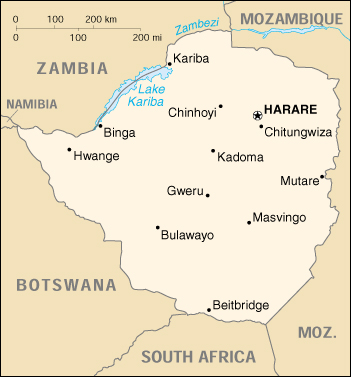

Status Quo Side: Rhodesian government
Non-Status Quo Side: Patriotic Front rebel movement
Region: Africa
Conflict Type: Colonial
Issues in Dispute: Independence
From 1889 the British South Africa Company ruled Rhodesia under royal charter. UK annexation in 1923 led to the 1953-63 federation with today's Malawi and Zambia. African nationalist organization, SRANC, was formed in 1957 and banned in 1959 as was its successor 1961 NDP despite UN protests. In 1962 Ian Smith's rightist Rhodesian Front won limited white elections and Rhodesia left the federation. Malawi and Zambia gained independence. In 1962, the NDP was replaced by the Zimbabwe African People's Union (ZAPU) led by Joshua Nkomo. Anti-Nkomo fervor produced the Zimbabwe African National Union (ZANU) in August 1963, organized by Ndabaningi Sithole, and led later by Robert Mugabe. Banned in 1964, ZANU and ZAPU established themselves in Zambia and Mozambique respectively. [see MOZ]
In May 1965 Smith's government declared an emergency, and on November 11 unilaterally declared independence from Britain. Nkomo was banished without trial, and five nationalist leaders were executed over Queen Elizabeth's objections. The economy suffered under international sanctions but survived with South African help. The OAU called on Britain to use force against Smith. From April 25 1966 ZAPU and ZANU launched sporadic attacks against Rhodesian security forces and each other. In 1970 Smith declared Rhodesia a republic based on white supremacy.
Protracted warfare caused thousands of deaths and vast population migrations among the nine million inhabitants, while the white population of 260,000 declined by 20 percent. Attempts at talks between 1974-78 were unsuccessful. A ZAPU-ZANU alliance, the Patriotic Front, formed in 1975 after Mozambique's independence, energized the conflict. Concerned Western powers and South Africa, feared communist intervention and sought modification of minority rule. Reforms in 1977-78, and multi-racial elections in 1979 brought victory to Bishop Muzorewa's United African National Council, rejected by Britain and the Patriotic Front.The US continued sanctions, OAU recognized the Patriotic Front, war escalated, and South African support waxed and waned.
After several failed attempts in the late 1970s, the US and UK, convened an all-party conference in London, where in late 1979 a constitution was approved. A transition governor was appointed; a cease-fire was signed in December; and UN, US. and UK sanctions were lifted. Limited violence continued.
In UK-supervised, multi-racial elections in February 1980, Mugabe's party won 57 seats, Nkomo's 20 and Muzorewa's 3. On April 18 Zimbabwe was declared independent with Mugabe Prime Minister of a moderate Marxist state. By the late 1980s the ruling party, now including ZAPU as well as ZANU, ceased to call itself Marxist.
By 2000, President Mugabe had become tyrannical and arbitrary, failing to deliver on promised land reform and presiding over a ruined economy for which his corrupt regime bore responsibility. A new opposition movement led by trade union leader Morgan Tsvangirai was severely intimidated by Mugabe loyalists. In April, goaded by Mugabe, gangs stormed white-owned farms, murdering several white farm owners and driving black farm workers from their homes. Mugabe alternated between inflammatory rhetoric and promises to cool the situation.